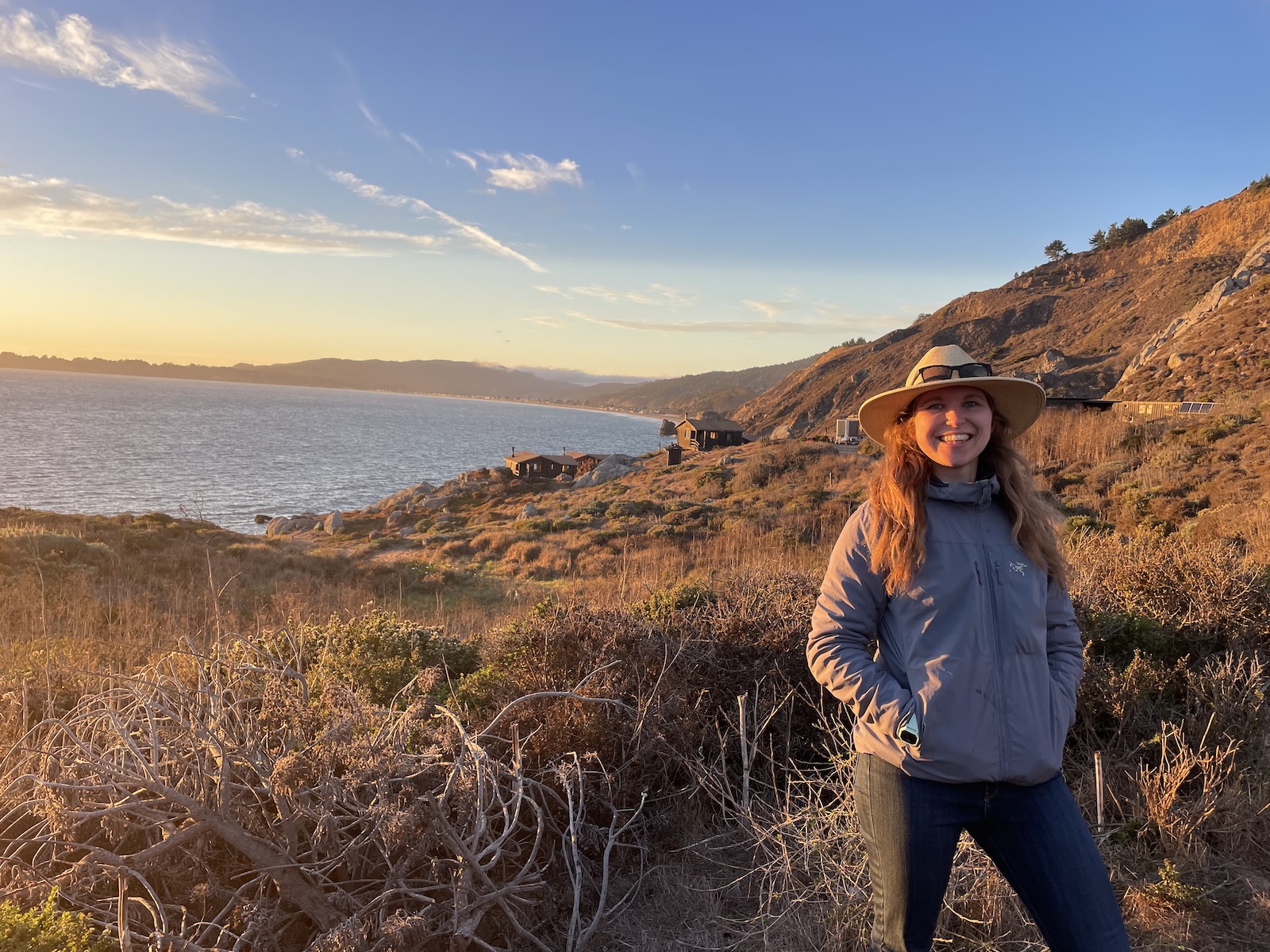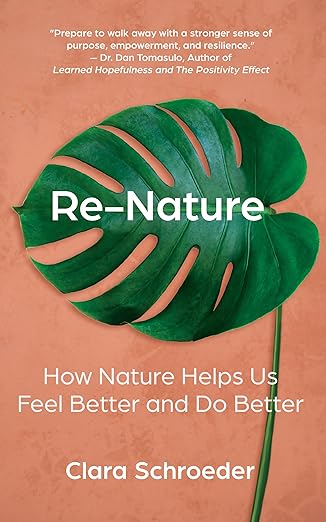A conversation with Fitness and Recreation Outdoor Instructor, Clara Schroeder.
What do you really do at CLS?
My official job title is Outdoor Instructor at UCSF's Fitness and Recreation Outdoor Program. I take students, staff, and anyone connected to UCSF who buys the outdoor rec pass on trips. We do kayaking, camping, backpacking, and hiking. It’s pretty casual, nothing too strenuous. We have two seasons, from January through June and then from August through November. We usually do one or two-night trips, mostly on weekends.
Can you give an example of the location?
My last trip was to Pinnacles National Park, which is really close. Pinnacles is two and a half hours south of us. It looks like the desert, and they have the biggest population of California condors, which are the biggest birds that we have here. They look like turkey vultures but are like three times as big. Their wingspan is nine feet long at adult size! Pinnacles is one of the only places you can see them easily.
The hike is great. We go up into the peaks. It's one of my favorites. We also go near Stinson Beach and stay in cabins up there. That's one of the best ones. Yosemite, Tahoe, Big Sur, Mendocino…
We provide all the gear, all the food, all the guiding, obviously, all the reservations, because it's impossible to get camping reservations in most of California.
 Schroeder leads a group in a Kayaking activity in Monterey, October 2024.
Schroeder leads a group in a Kayaking activity in Monterey, October 2024.
How long have you worked at UCSF?
A little over a year, so three seasons. I got hired on May 9, 2024 and led my first trip over Memorial Day weekend in Santa Cruz.
What is your favorite part of the job?
For me, as an ecotherapist, it’s seeing the impact that spending time outside with others has on the students and the people who go on these trips. They usually arrive late on a Friday because they have class. They have labs. They are super busy. So, they're finishing up their week, getting to the spot that we're in, and we're all prepared for them.
They’re in high-energy stress and really needing the break. By Sunday morning, which is usually when we end our trips, they're all talking about things that are not related to work or class.
Just feeling the energy shifts over the weekend, I love seeing that impact and the connection, the joy, the relaxation, the emotional, mental, and physical health benefits, which is something that I track personally because of my background in psychology.
 Schroeder leading an Earth Day group nature connection workshop at a private equestrian ranch in the SF North Bay.
Schroeder leading an Earth Day group nature connection workshop at a private equestrian ranch in the SF North Bay.
For folks who don't know, what is an ecotherapist?
Ecotherapy is the idea that nature is a healing place and can be a source of support, so I tend to do that through the coaching lens. I work with nonclinical populations, sometimes people in leadership positions, sometimes individuals who are going through or have gone through some kind of transition in their lives. We basically do some self-development process outside. Sometimes I work remotely as well with people on their nature connection. It's the practice of well-being through connecting with nature and the natural world.
How do you bring ecotherapy to the trips you lead?
Sometimes, if the group wants it or it's a small enough group and I have enough time, I will lead a nature meditation in the morning. So, we'll wake up and do that first, then have a little pancake breakfast.
The conversations are really interesting, and they reflect on the role that nature has in their life and how they could include it more. Just by having these conversations, it ripples out to their communities.
 Schroeder leading a camping trip at Steep Ravine cabins, November 2024.
Schroeder leading a camping trip at Steep Ravine cabins, November 2024.
Where'd you grow up?
I grew up primarily in Europe. My parents are French German. I was born in Asia, in Taipei.
I've lived in six countries before I turned 16.
I made my way to California halfway through high school and have stayed in the Bay Area since, minus grad school. Identity wise, “French Californian” is what I tend to tell people.
How has living in so many different places during your formative years made you the person you are today, and informed your approach to these trips?
I think when you're uprooted a lot, geographically speaking, as I was, you build a lot of resilience and adaptability, which, honestly, these trips also train you to do.
I had to rely on my skills of observation and my skills of cultural understanding to survive because I was moving from countries where I didn't really have the language or the local knowledge of the culture.
It's about really learning to trust yourself, which I think you have to do when you get put in a situation that's uncomfortable
When you go outdoors, first, I want to acknowledge that not everyone is going to be comfortable, and not everyone grew up feeling like the outdoors was a safe, welcoming, and inclusive space for them.
But whatever background you're coming from, you learn new skills. You learn to play with the threshold of what's comfortable and what's a good edge and what's an edge that's too much. I think nature offers different experiences that we don't get when we sit in our offices, when we sit in front of our computers, and we learn things about ourselves.
 The view from the Steep Ravine camping trip, November 2024.
The view from the Steep Ravine camping trip, November 2024.
What did you do before coming to Campus Life Services?
I became an entrepreneur, right out of grad school. I studied psychology and became certified as an ecotherapist. And from there, I started leading people in sessions, and retreats outside.
I want to help people reconnect with nature and themselves, to improve their lives and the planet's future — our common future. This is part of why I wanted to share more of my writing with people.
I started to write a book about re-naturing, so that people know more about ecotherapy, and how they can cultivate their own relationship and connection with nature, just like I do in a different way when I'm guiding.
What does “re-nature” mean to you? Why did you choose that title?
 Schroeder's book Re-Nature: How Nature Helps Us Feel Better and Do Better
Schroeder's book Re-Nature: How Nature Helps Us Feel Better and Do Better
Renaturing is spending time intentionally connecting with the natural world. It’s more of a present moment, intentional practice of being outside and letting your nervous system auto-regulate just by stepping out and seeing a broader horizon versus your computer screen, that is so focused.
I'm all for outdoor recreation and exercising, obviously, but also, there's something to be said about going for a walk by yourself without any music in your ears, no phones, no distractions. The research on mindfulness is incredible.
I'm a spiritual person, and my relationship with nature is a part of that. So that's one lens, but there's also a very, like, pragmatic, scientific, more corporate-focused lens. The book combines all these different modalities, the scientific benefits of connecting with nature (there are so many), and the productivity and creativity metrics for employees who spend time outside in nature during the day and after their workday. It’s so interesting.
A global study cited by Harvard Business Review showed that having natural features in a work environment increased employee creativity by 15% and productivity by 6%.
We are a part of nature, and if we don't do something about it now and recognize that we are and re-nature ourselves and our lives, we are going towards an auto-destructive pathway. But it doesn't have to be a doom and gloom narrative, if we just open our hearts up a little bit to the healing potential.
Schroeder’s book, Re-Nature: How Nature Helps Us Feel Better and Do Better, is coming out on October 9. To pre-order, you can visit Schroeder's website. To learn more about upcoming Outdoor Programs, visit the Fitness and Recreation website.